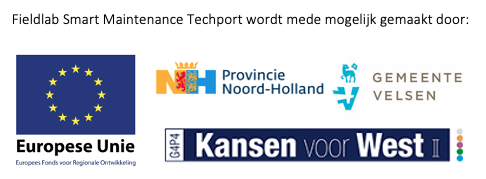Royal Navy and Techport join hands on Smart Maintenance theme
Installations on Royal Navy ships are becoming increasingly complex and sophisticated, which requires a different view of maintenance. Maintenance is ingrained in the design of the ship and the desire for modern maintenance must then be included at the very beginning. But what do those wishes look like in concrete terms? What measurements must be possible? And how often? The Royal Netherlands Navy is starting a study in the pilot plant of the Fieldlab Smart Maintenance to gain insight into the effects of different types of measurements with intentionally defective bearings. This should contribute to installations made for smart maintenance.
Modern ships, modern maintenance
The Data for Maintenance team within the Directorate of Materiel Maintenance (DMI) of the Royal Navy is working toward the required modern maintenance of the ships. Marc Hulzebos and Sietze Bruinsma are maintenance engineers at the Condition Monitoring Department and want to gain more insight into high-frequency current and voltage measurements compared to more conventional vibration measurements through research at the Fieldlab. With four electric motor-pump setups, the test setup at the Fieldlab is the ideal test environment because the measurements can be made with intentionally defective bearings. A number of bearings have therefore been standardized broken for the study and analysis of data will reveal whether this is reflected in the different measurement methods.
Combining expertise
The state-of-the-art ships that the Royal Navy is going to order will be kept in full operation with a small crew. That requires cooperation of different areas of expertise and limiting maintenance burden. Where previously the Head of TD knew most about an installation, the Head of TD now brings the disciplines together. This starts already on land where maintenance engineers and data engineers work together on smart on-board solutions. Smart maintenance means change for everyone involved in maintenance. Bart Pollmann, member of the Data for Maintenance team: "We have to start small and show that modern maintenance works. Step by step to enthuse and show the possibilities. Testing in the pilot plant is part of that. It is a very safe environment and that is nice to be able to test. Of course, we still have to wait for the results. "The final results of the tests will be shared with the consortium partners within the Fieldlab Smart Maintenance."
Collaboration
Gerik ten Berge, program manager Fieldlab Smart Maintenance, on the collaboration. "The upcoming test of the Royal Navy shows where the added value of the Field Lab Smart Maintenance Techport lies. Not only do we as Techport have test facilities in the pilot plant, but within the Fieldlab various parties with expertise in the Smart Maintenance theme work together. Good to see that Fieldlab partners like Facta, SKF and Semiotic Labs are hooked up to the tests. We are happy with the cooperation with the Royal Navy and see many starting points for the future to expand this." Bart Pollmann is curious, "I am curious to see how this trial can contribute to the future maintainability of our beautiful new ships. Curious about how the maintenance engineer and the data scientist together can come up with good maintenance recommendations. Curious to see where the collaboration with Techport can lead."
About the study
The failure mechanisms that the Royal Navy wants to measure are applied to the pilot plant, and a record is kept of exactly what was changed to the system from each measurement. After each type of failure mechanism applied, the system is reset to zero as best as possible. This also automatically generates a lot of healthy data and ensures that the basis of each applied failure is correct. As many failure mechanisms as possible are applied in multiple degrees. By allowing the parts to break down on purpose, the sensors learn to recognize things better and predictable maintenance can be performed based on algorithms. The data must initially remain offline to ensure a blind study. The experiences and results of the study will be shared with the consortium partners.
Learn more:
Bart Pollmann, Royal Navy
https://www.defensie.nl/organisatie/marine/eenheden/directie-materiele-instandhouding
Gerik ten Berge, Techport
